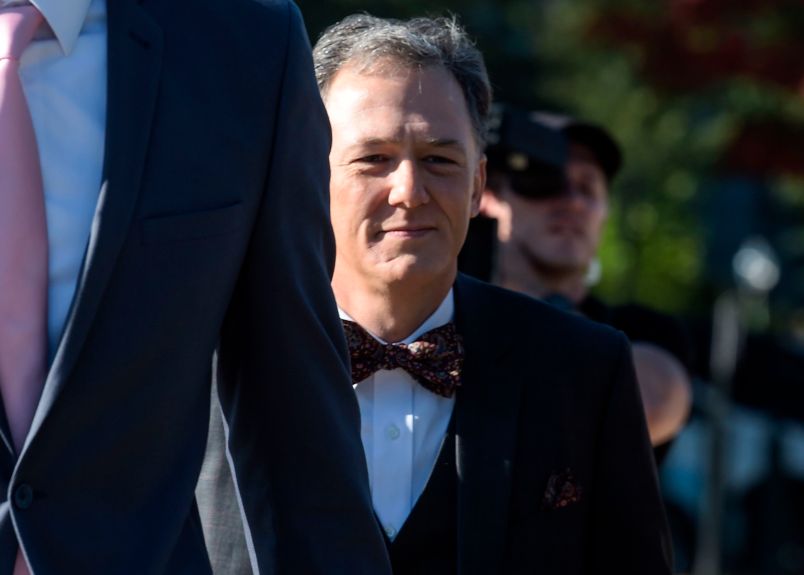The House committees leading the impeachment inquiry on Thursday released a transcript of the testimony of George Kent, the deputy assistant secretary of state for Europe and Eurasian affairs. Reports emerged after Kent’s testimony last month that he was told to “lay low” after criticizing Rudy Giuliani’s involvement in Ukraine policy.
In his testimony, Kent revealed more details on Giuliani’s attempts to meet with two Ukrainian prosecutors in the U.S., both of which never happened.
Read the highlights from Kent’s testimony below:
Kent heard in May 2018 of a plan for Lutsenko to fly to NY to meet Giuliani.
Kent testified that he learned of Rudy Giuliani’s contacts with Yuriy Lutsenko, the top Ukraine prosecutor who Giuliani was working with in his smear campaign, in May 2018. Kent said Lutsenko planned to fly to New York to meet Giuliani but that those plans fell through.
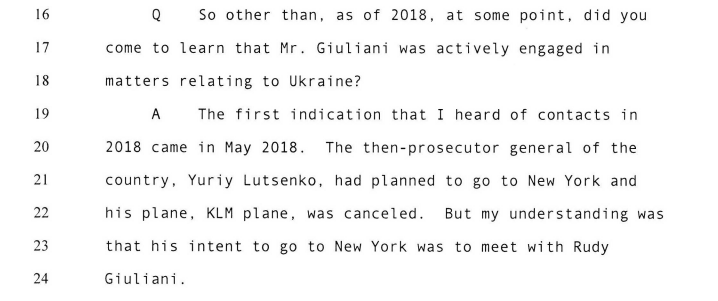
Kent said he heard about the cancelled trip both from Ukrainian media as well as from the head of a Ukrainian diaspora organization, who supposedly had been told by Lutsenko of his plans.
Kent was told that Poroshenko OKed Lutsenko’s disclosure’s to Giuliani.
Kent said that while visiting Ukraine in May, four separate Ukrainian officials and former officials told him that Petro Poroshenko, the former Ukrainian President who lost to Zelensky, had authorized his prosecutor Lutsenko to make the disclosures he made to Giuliani. Kent chose his words carefully, but said that the disclosures in question “led to the attacks on” former U.S. Ambassador to Ukraine Marie Yovanovitch.
The revelation came after Kent discussed with the committees a call Sondland apparently made to Poroshenko in March telling him to lay off of Yovanovitch.

Kent sought to block Shokin’s visa because he thought Shokin was coming to the U.S. to spread a bunch of “hooey.”
It was previously known that Rudy Giuliani had sought unsuccessfully to get a visa for Victor Shokin — a former Ukraine prosecutor who was key to the smears being peddled against Biden — to travel to the U.S. Kent gave the backstory on why the State Department resisted granting the visa. Kent’s colleagues were told that Shokin “wanted to come to the United States to share information suggesting that there was corruption at the U.S. embassy.”
“Knowing Mr. Shokin, I had full faith that it was bunch of hooey, and he was looking to basically engage in a con game out of revenge because he’d lost his job,” Kent testified.
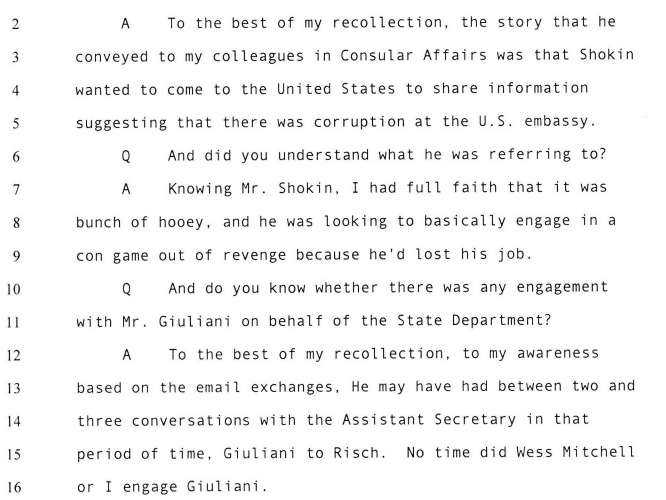
Kent said that Rob Blair, the deputy White House chief of staff, called the State Department to see what was going on with the visa request.
“We laid out enough frank detail about U.5. Government engagement and assessment of Mr. Shokin. And Mr. Blair said, thank you very much, I’ve heard enough,” Kent recalled.
Kent says there’s an email showing a Sondland exchange that Sondland said he couldn’t recall.
Gordon Sondland, a U.S. ambassador to the EU, previously testified he didn’t recall telling Yonovitch to tweet out her support of Trump. Yovanovitch said Sondland gave her the advice as she was looking for help in dealing with the false smears against. Kent, in testimony, not only backed Yovanovitch’s account, but said Sondland proposed the idea in an email.
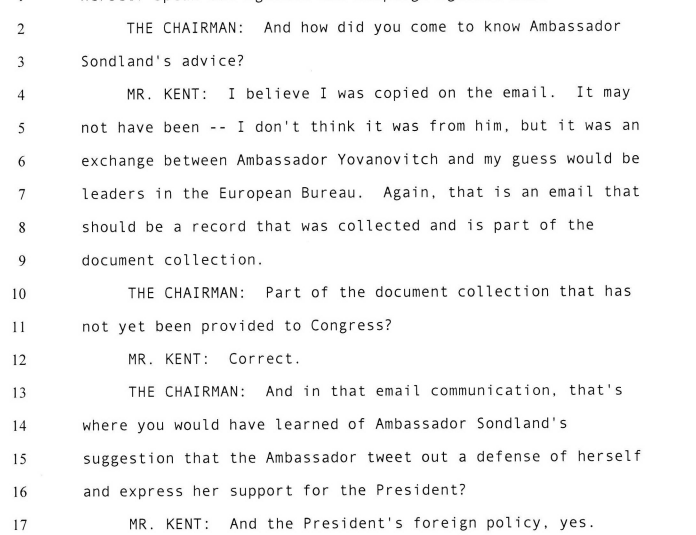
After Giuliani attacked him, Kent was told to “lower my profile in Ukraine.”
Giuliani went after Kent and others in late May, and Kent was subsequently told to “keep my head down and lower my profile in Ukraine,” he testified.
Giuliani’s attack was consistent with others he made against diplomats working in Ukraine, who he blamed for his decision to cancel a May trip to Ukraine that month in which he planned to push investigations helpful to President Trump.
“All I can tell you is the things I heard about [ousted U.S. ambassador to Ukraine Marie Yovanovitch,” Giuliani said at the time. “Which is that her embassy was involved heavily in finding dirty information and creating it on people in the Trump campaign. That they were heavily involved in helping Soros (including getting a case dismissed that would hurt him), and George Kent and her were the deputy.”
Asked during the deposition who told him to lay low, Kent said Acting Assistant Secretary of State Phil Reeker did, relaying a message from Undersecretary of State David Hale. (Hale testified to the committee on Wednesday; Reeker testified Oct. 26.)
“All I know is that Assistant Secretary Reeker, after a meeting with Under Secretary Hale said that Under Secretary Hale had directed me to keep my head down and a lower profile on Ukraine,” Kent said.

Kent implies that Mulvaney got Sondland added to the delegation for Zelensky’s inauguration.
Sondland wasn’t on the original list of delegates for the inauguration, but Kent testified that he wasn’t surprised when Sondland was added given Sondland’s relationship with White House chief of staff Mick Mulvaney. Kent added later than he believed Sondland’s Mulvaney connection also got him and others the May 23 debriefing from the Ukraine trip, during which Trump told them to talk to Giuliani.
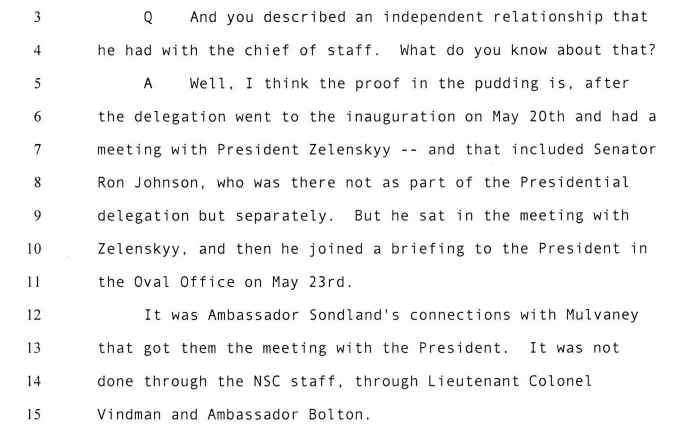
Zelensky’s Aide brought up Volker’s desire for investigations of “Biden and Clinton” in a meeting.
During a meeting in which Volker brought up that Ukraine had opened an investigation of former President Petro Poroshenko, saying he thought it was inappropriate, the Ukrainians countered.
“What? You mean the type of investigations you’re pushing for us to do on Biden and Clinton?” the Ukraine presidential aide Andrey Yermak responded. Acting ambassador Bill Taylor was also in the room and recounted the conversation to Kent the next morning, Kent said.
In the same meeting, Kent said Taylor recalled, Taylor recommended that Ukraine not provide the assurances for political investigations that Volker was pressing them to provide. “Don’t do that,” Taylor recalled to Kent that he said
Ukrainians weren’t sure what to make of Giuliani, Parnas and Fruman.
Describing his interactions with various Ukrainians officials, Kent said they weren’t sure what to make of Giuliani, Lev Parnas and Igor Fruman.
Ukrainian interior minister Arsen Avakov told Kent in February that Yuriy Lutsenko was coming to the U.S. “to throw mud” at Kent, Yovanovitch and others, and that Avakov thought it was “the wrong thing to do,” in Kent’s words — and that “Lutsenko was a fool to have made a private trip and to have done what he did.”
In May, Kent said, Avokov told him that Giuliani had invited the interior minister to Florida to “meet the group of them.” Avokov declined, but agreed to meet over coffee in Ukraine.
Kent described another conversation with a friend of then-President-Elect Zelensky, Ivan Bakonov, in May. Bakonov went on to be the head of Ukraine’s security service.
Bakonov said Fruman and another man — later determined to be Parnas — wanted to meet with him, and asked Kent’s advice.
Kent said he repeated what Avakov told him: You can meet, but “you don’t have to make any commitments.”
Kent said he didn’t know the specific reason for Parnas and Fruman planned trip to Ukraine in May, but said it came in the course of their months-long effort to undermine Ambassador Yovanovitch.
Volker brushed off Kent’s concerns about working with Giuliani.
Kent was skeptical of Giuliani’s involvement in the diplomatic process, but when he confronted Volker about it, the Ukraine special envoy blew off his concerns.
After speaking with Zelensky in a sidebar conversation at a conference in Canada, Volker told Kent that he planned to start reaching out to Giuliani, saying the former New York mayor “had influence on the President” in terms of his thinking on Ukraine, Kent recalled.
Kent raised his concerns: What would he engage with Giuliani about? “Because former Mayor Giuliani has a track record of, you know, asking for a visa for a corrupt former prosecutor. He attacked Masha [former Ambassador Yovanovitch], and he’s tweeting that the new President needs to investigate Biden and the 2016 campaign.”
“Well, if there’s nothing there, what does it matter?” Kent recalled the Ukraine special envoy saying. “And if there is something there, it should be investigated.”
That, Kent recalled telling Volker, “undermines our advocacy of the rule of the law.”
Volker, Kent said, didn’t respond.
Kent added later that “Kurt was thinking tactically and I was concerned
strategically.”

After hearing that Voker told the Ukrainians that Giuliani wanted them to “initiate” investigations, Kent wrote a protest memo.
In August, after he saw a pattern emerge, Kent wrote a memo protesting the “effort to initiate politically motivated prosecutions that were injurious to the rule of law, both in Ukraine and the U.S.”
The memo followed two conversations that Kent said echoed each other. First, Catherine Croft, a new assistant to the special Ukraine envoy, asked him, “Have we ever asked the Ukrainians to investigate anybody?” She was trying to find information on Kurt’s behalf, Kent recalled her saying.
Kent replied that while there are formal law enforcement cooperation agreements in place, he “hoped we haven’t” asked the Ukrainians to investigate anyone for political reasons.
Kent said he told Croft: “Kurt has a lot of ideas. Some of them are great; some of them are not so good.”
The next day, he said, he heard from acting Ukraine ambassador Bill Taylor. Taylor said that Volker had been engaging Andrey Yermak, a top aide to Zelensky, “that the President and his private attorney, Rudy Giuliani, were interested in the initiation of investigations.”
Yermak, Taylor told Kent, was “uncomfortable when this was raised with him” and suggested any such request would have to go through formal channels
Read Kent’s full testimony here, or below:


